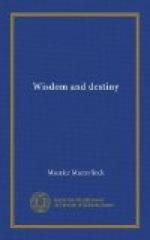That loftiness within us, from whose summit we venture to pass judgment on the totality of life, to absolve or condemn it, is doubtless the merest pin-prick, visible to our eye alone, on the illimitable sphere of life. It is wise to think and to act as though all that happened to man were all that man most required. It is not long ago—to cite only one of the problems that the instinct of our planet is invited to solve—that a scheme was on foot to inquire of the thinkers of Europe whether it should rightly be held as a gain or a loss to mankind if an energetic, strenuous, persistent race, which some, through prejudice doubtless, still regard as inferior to the Aryan in qualities of heart and of soul—if the Jews, in a word, were to vanish from the face of the earth, or to acquire preponderance there. I am satisfied that the sage might answer, without laying himself open to the charge of indifference or undue resignation, “In what comes to pass will be happiness.” Many things happen that seem unjust to us; but of all the achievements of reason there has been none so helpful as the discovery of the loftier reason that underlies the misdeeds of nature. It is from the slow and gradual vindication of the unknown force that we deemed at first to be pitiless, that our moral and physical life has derived its chief prop and support. If a race disappears that conforms with our every ideal, it will be only because our ideal still falls short of the grand ideal, which is, as we have said, the intimate truth of the universe.
Our own experience has taught us that even in this world of reality there exist dreams and desires, thoughts and feelings of beauty, of justice, and love, that are of the noblest and loftiest. And if there be any that shrink from the test of reality—in other words, from the mysterious, nameless power of life—it follows that these must be different, but not that their beauty is less, or their vastness, or power to console. Till reality confront us, it is well, it may be, to cherish ideals that we hold to surpass it in beauty; but once face to face with reality, then must the ideal flame that has fed on our noblest desires be content to throw faithful light on the less fragile, less tender beauty of the mighty mass that crushes these desires. Nor does this seem to me to imply a mere drowsy fatalism, or servile acquiescence, or optimism shrinking from action. The sage no doubt must many a time forfeit some measure of the blind, the head-strong, fanatical zeal that has enabled some men, whose reason was fettered and bound, to achieve results that are nigh superhuman; but therefore none the less is it certain that no man of upright soul should go forth in search of illusion or blindness, of zeal or vigour, in a region inferior to that of his noblest hours. To do our true duty in life, it must ever be done with the aid of all that is highest in our soul, highest in the truth that is ours. And even though it be permissible at times in actual, every-day life to compromise with events, and not follow impulse to the ruthless end—as did St. Just, for instance, who in his admirable and ardent desire for universal peace, happiness, justice, in all good faith sent thousands to the scaffold—in the life of thought it is our unvarying duty to pursue our thought right to the end.




